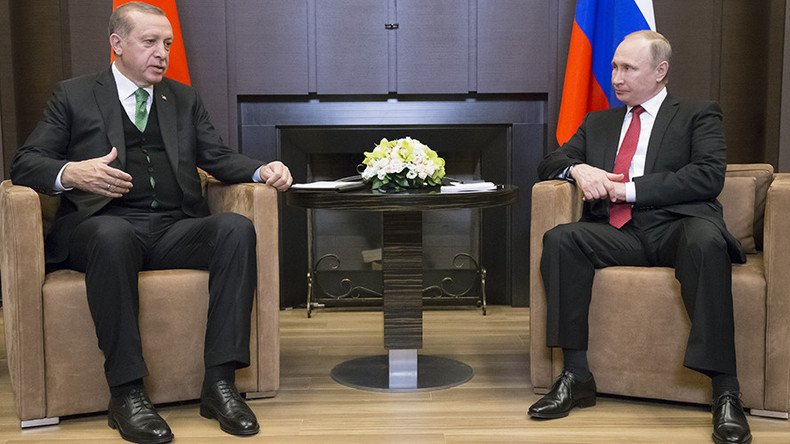The joint efforts of Russia, Turkey and Iran on a settlement of the Syrian conflict are paying off, as the level of violence has decreased in the country, Vladimir Putin said after meeting with Turkish President Recep Tayyip Erdogan in Sochi.
Putin and Erdogan emerged after a marathon four-hour-long meeting. In addition to Syria, they discussed several other bilateral issues, ranging from joint counterterrorism efforts to economic cooperation in the trade and energy sectors.
"I would like to note with satisfaction that our joint work with Turkey and Iran as guarantors of the ‘Astana process’ continues to yield concrete results. The level of violence has certainly decreased and favorable conditions are being created for promoting inter-Syrian dialogue under the auspices of the UN," the Russian President told reporters.
Putin and Erdogan also agreed to "step up efforts to ensure long-term normalization in this country, primarily to advance the process of political settlement and to assist the Syrians in post-conflict reconstruction."
The Turkish leader echoed Putin by saying the Astana meetings “have made some contribution to reducing violence in this region.” Erdogan added, “We came to an agreement that, at this moment, there’s ground, which allows us to focus on the political resolution” of the Syrian crisis.
Following the Putin-Erdogan meeting, Kremlin press-secretary, Dmitry Peskov, was asked if Erdogan’s calls for US and Russia to withdraw troops from Syria were on the agenda. Peskov replied that the issues discussed between the two leaders were “a lot more complicated and are not to be disclosed.”
Before departing for Sochi, Erdogan commented on the joint Russia-US statement, in which the countries agreed there was no military solution to the Syrian crisis, saying, that in this case, they “should pull their troops out.” Turkey's Hurriyet newspaper reported that Erdogan promised to "talk with Putin as well about this.”
Russia, Turkey and Iran are the guarantors of the four de-escalation zones in Syria, which were agreed during talks in the Kazakh capital, Astana in May, and which led to a decrease in violence in the war-torn country. The deal, approved by the Syrian government, is aimed at separating extremist groups such as Islamic State (IS, formerly ISIS, ISIL) and the former Al-Nusra Front from so-called moderate opposition formations. Russian, Iranian and Turkish forces are monitoring the situation in the designated zones to avoid clashes between the warring factions.

